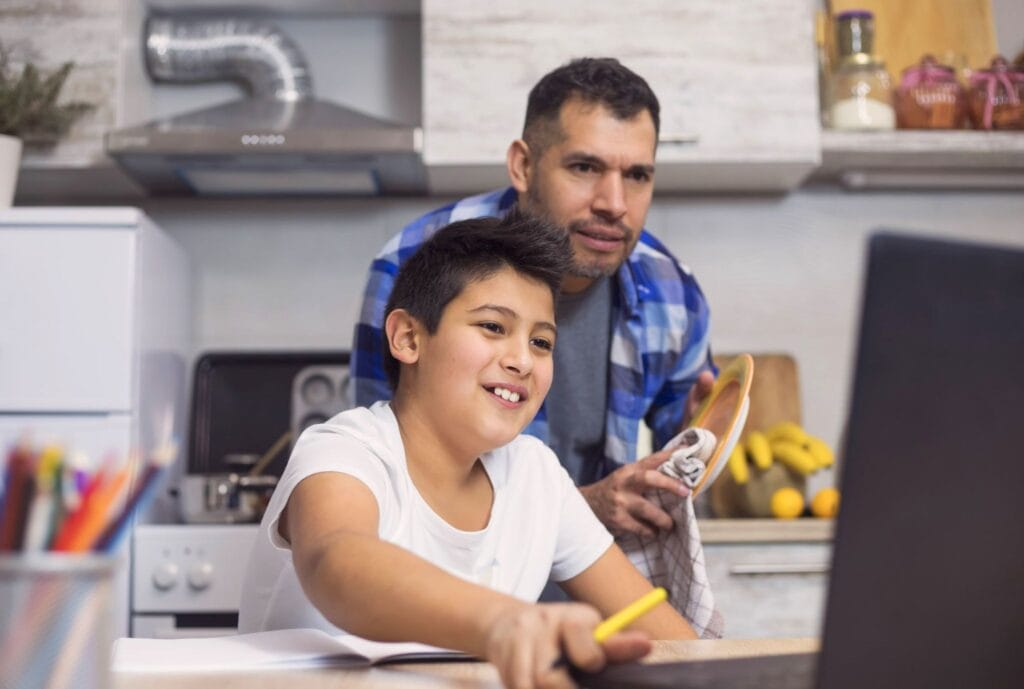Online education is growing rapidly, offering students a flexible, personalized alternative to traditional school. Research shows a steady increase in K–12 students receiving academic instruction at home, reflecting the ongoing shift toward digital learning environments. But with so many options available, how do you determine which online school is right for your child?
Choosing the right online school is essential for your child’s academic success and personal development. In this guide, we’ll walk you through key considerations, tips, and strategies to help you know how to pick an online school that meets your child’s unique needs.
Why choose an online school?
Online learning models offer a wealth of opportunities for students to thrive, and there are several benefits over traditional classroom schooling. So, before we dig into the details of how to choose an online school, let’s explore a list of advantages to discover why it may be an excellent pathway for your child’s learning and development.
Flexibility in Schedules
Without the fixed structure of a traditional school day, online learners can study at the times that work best for them. Whether your child is most focused in the early morning or prefers to tackle lessons after dinner, online schooling provides the flexibility to create a schedule that fits their needs. Please note there may still be scheduled classes at set times, but online learning can generally provide a new level of control over your daily schedule.
Personalized Learning at the Student’s Pace
Online schools allow students to progress at their own pace. If your child excels in a subject, they can move ahead without waiting for the class. On the flip side, they can spend extra time mastering challenging topics—building both confidence and a deeper understanding of the material. Also, at schools powered by K12, certified teachers are there to help and can adjust their approach based on individual student needs.
Safe Learning Environment
Concerns like bullying and overcrowded classrooms can add stress to traditional schooling. Online learning offers a safe, supportive space where students can focus on academics without distractions or intimidation.
Continuity During Travel or Relocation
For families who travel frequently, relocate often, or live in unique circumstances, online schooling offers uninterrupted learning from anywhere with an internet connection. You can use K12’s school finder to learn more about the options that exist near you or near your new destination.
Access to Diverse Curricula and Specialized Courses
A solid online education covers an in-depth study of the basics and caters to students with specific interests through personalized learning paths. For example, the K12 curriculum is based on more than 25 years of research and is specifically designed to spark curiosity, ignite imaginations, and empower students to take ownership of their education. It offers advanced courses, dual enrollment, career-specific options, and credit recovery.
Checklist: Top Considerations When Choosing an Online School
Learning how to choose an online school requires careful research and consideration. Here’s a checklist of factors to evaluate so you can make an informed decision:
- State-Specific Requirements: Ensure the school complies with state regulations for teacher qualifications, curriculum standards, and credit transferability.
- Accreditation: Look for accreditation from recognized organizations to ensure the program meets rigorous academic standards.
- Cost and Financial Aid: Review tuition, fees, and financial aid options to understand the full cost of enrollment.
- Curriculum Quality: Choose a school with a well-rounded, research-based curriculum that supports your child’s academic goals.
- Teaching Methods: Look for schools offering a mix of live instruction and self-paced learning that matches your child’s learning style.
- Support Services: Verify the availability of tech support, academic assistance, and special education resources.
- Extracurricular Activities: Seek programs that offer clubs, sports, or other activities to foster social and emotional growth.
- Teacher Qualifications: Ensure instructors are experienced, certified, and trained in online education.
- Graduation Rate and College Prep: High graduation rates and strong college prep programs reflect a school’s ability to set students up for success.
- Reputation and Reviews: Read reviews and testimonials from parents, students, and alums to gauge the school’s reputation.
By carefully evaluating these factors, crafting a shortlist of online schools that align with your child’s educational, emotional, and extracurricular needs becomes much easier.
How to Pick an Online School: Do’s and Don’ts
With your shortlist of favorites at hand, it’s time to whittle down the options so you can decide and enroll your child. Here are a few best practices for do’s and don’ts to help you navigate the crucial final stages of selection.
Do This When Picking an Online School
Here are our top recommendations for how to choose an online school that will fuel your child’s unique learning needs and set them up for a successful and rewarding academic journey:
- Do research school ratings and reviews. Understanding what current and past students and parents think can be instrumental in helping you make a well-informed choice.
- Do inquire about student-to-teacher ratios. Smaller class sizes often mean more personalized attention, which enhances the overall learning experience.
- Do visit online school demos or attend informational webinars. This will give you a firsthand look at the learning environment and a sneak peek into teaching methods. K12 offers many of these.
- Do talk to other parents or students enrolled in the school. They can provide firsthand insights into day-to-day experiences, helping you and your child learn what to expect.
- Do evaluate the school’s communication channels. Frequent and clear communication between parents, teachers, and students is vital for tracking progress and addressing concerns.
- Do verify technology and internet requirements to prevent technical issues. Access to the right tech tools and sufficient internet speed are essential for success in an online setting.
- Do review the curriculum for adaptability. Ensure the school’s curriculum and approach fit your child’s learning style, needs, and pace to foster growth and confidence.
- Do ensure the program aligns with your child’s long-term goals. Whether you focus on college preparation or career readiness, the programs you choose now will directly affect your child’s future.
By following these best practices, you can choose an online school that fits your child’s needs and ensures they have the support and resources they need to succeed academically and personally.
Don’t Do This When Choosing an Online School
With the best practices for how to choose an online school clear, let’s examine a few common pitfalls you’ll want to avoid:
- Don’t choose based solely on cost. A quality education should always be the primary factor in your decision and there are many tuition-free online schools, like those powered by K12.
- Don’t overlook the importance of teacher qualifications. Highly knowledgeable and experienced teachers make a huge difference in your child’s learning experience.
- Don’t skip the trial period or test courses. If your favorite school offers these, take advantage of them to get a feel for the learning environment and teaching style.
- Don’t rush the decision without understanding all factors. Take the time to assess all aspects of each school to ensure you pick the best fit.
- Don’t forget about hidden costs like materials, software, and extracurricular activities. Some schools include materials and offer lots of social activities, but double check the details.
- Don’t ignore your child’s input. While you may have the final say, involving your child in the decision-making process is important to ensure they feel comfortable with the choice.
Avoiding these things will help you make a more thoughtful decision, ultimately ensuring your child’s educational experience is both rewarding and aligned with their long-term goals.
5 Signs Your Child Is Ready for an Online School
Deciding if online schooling is the right fit for your child involves careful reflection and assessment. Here are a few telltale signs that your child may thrive in an online learning environment. Of course, they may vary based on your child’s age and grade level. For younger students, parents are often more hands-on in their online schoolwork while they become independent learners.
1. High Levels of Self-Motivation and Independence
The students who tend to thrive in online school are self-starters who can stay focused and work without constant supervision. If your child finishes homework independently, completes personal tasks ahead of deadlines, or pursues extracurricular activities independently, they would likely cope well with an online study format.
2. Effective Time Management Skills
If your child is already adept at balancing activities like schoolwork, chores, and hobbies, it’s a good sign they may be well-suited to online study. If you’re unsure, look for signs like your child keeping track of their own schedule and completing academic projects on time while still having time to spend with their friends.
3. Comfort With Technology and Virtual Communication
Students must be able to navigate virtual classrooms, communicate via email or video call, and troubleshoot minor tech issues independently. If your child is already comfortable with these technologies or regularly uses a computer for gaming, socializing, or browsing without getting frustrated, they should be well-prepared for online learning.
4. Willingness to Adapt to a Less Social Environment
Sometimes, children can feel a little isolated in an online setting. However, it can be a great fit for kids who enjoy working independently. So, if your child prefers solitary activities like reading or drawing or shows higher levels of comfort in quieter, less interactive settings, it’s a good sign they may thrive in an online classroom. It’s also important to know that there are often opportunities through online schools for students to be social and make friends.
5. Comfort With Structured, Self-Paced Learning
While online learning allows students to move through materials more at their own pace, it still requires a certain focus. If your child sticks to their homework routine or remains engaged in subjects after school hours, they’ll likely feel at ease with online education’s self-paced, structured nature.
Transition Strategies for Making the Change to Online School
Learning how to pick an online school your child will love is just the first step. You must also prepare your child for their transition from in-person to online studies. Here are some helpful strategies you could employ to ensure smooth sailing.
- Establish a Routine: Build a daily schedule with structured study times, breaks, and physical activity.
- Create a Dedicated Learning Space: Designate a quiet, organized area for schoolwork, free from distractions.
- Encourage Social Connections: Look for virtual clubs or extracurriculars to help your child build friendships.
- Monitor Progress: Regularly check assignments, grades, and teacher communication to stay engaged in your child’s success.
- Provide Emotional Support: Acknowledge challenges, celebrate wins, and remind your child that setbacks are part of the learning process.
How to Choose an Online School: Setting Your Child Up for Online Learning Success
Choosing an online school is a big decision, but the right choice can open doors to academic success, personal growth, and a lifelong love for learning. By evaluating key factors like curriculum, teaching credentials and methods, and support services—and involving your child in the process—you’ll set them up for a rewarding online education experience.
Take the next step today. Explore how K12’s accredited online programs can help your child thrive and achieve their full potential.







